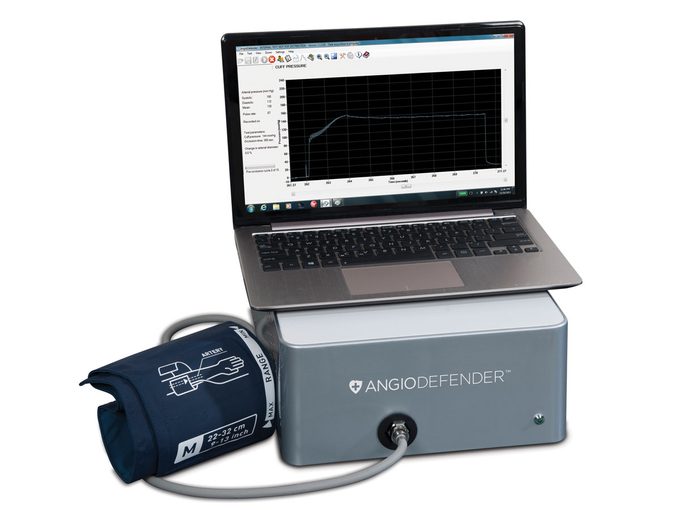Take the Test: Do You Know Your Heart Age?
This simple test can determine whether your heart age matches your actual age

Just how old is the old ticker? Well, it only takes 20 minutes to find out thanks to the AngioDefender, a new medical device now available in Canada. The device determines the age of your cardiovascular system by measuring your risk for developing cardiovascular disease, vascular dementia and inflammatory disease. It does this by testing your endothelium function, the best-known biomarker for early-stage cardiovascular disease.
Your endothelium is the inner lining of your blood vessels, and how well this lining functions predicts your vascular age. The test is conducted with the help of a nurse, who first asks a series of simple questions (sex, age, height, weight, smoking habits) before sliding a blood pressure cuff onto your arm. In addition to measuring your blood pressure, it also uses a pulse wave technology to measure your endothelium cell function, realized with a flow-mediated dilation (%FMD) score. The cuff is tightened and released to get accurate measurements before occluding your artery for 300 seconds. The pressure is released as it measures how quickly the blood rushes back to your fingers. Your heart age is calculated based on your %FMD score, blood pressure, body mass index score, cholesterol levels, as well as individual habits like smoking.

Early-stage dysfunction of your endothelium includes an inflammation of the blood vessel lining, resulting in a low %FMD score. Mid-stage dysfunction includes indications of plaque formation and calcium build-up in the lining of the blood vessels, resulting in higher blood pressure and cholesterol, while late-stage can mean blood clots in the lining, resulting in eventual blockage of the artery, causing chest pain, heart attack or stroke.
By finding out how old our heart is, we can assess our risk and make changes to our lifestyle in order to improve our heart health. Adding more exercise, quitting smoking, and adding more foods that contain flavonoids are just a couple of things that can go a long way to improving our cardiovascular health.
Not only is this non-invasive test quick, it’s cost-effective, too. An entry-level test starts at $80. Other ways to determine your risks of cardiovascular disease are invasive (brachial artery catherization), not accurate enough (Framingham risk score), or too costly (brachial artery ultrasound, when purchased privately at a hospital, can cost upwards of $1,000).
Right now, AngioDefender tests are currently available in Toronto, Mississauga, Windsor and London. Visit closingthegap.ca/angiodefender to book a test. There are plans in place to have the test available at healthcare facilities across Canada in 2017.




